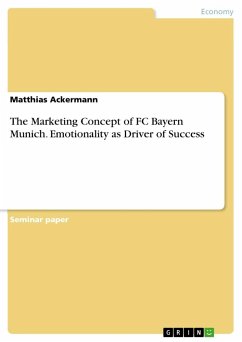Diploma Thesis from the year 2003 in the subject Business economics - Marketing, Corporate Communication, CRM, Market Research, Social Media, grade: 2,3, Berlin School of Economics and Law (unbekannt), language: English, abstract: Inhaltsangabe:Gang der Untersuchung:
Die Arbeit beschreibt das BEP (Basic Economic Principle Wirtschaftliche Grundprinzipien) Seminar in dem südafrikanischen Township Alexandria in Johannesburg im europäischen Sommer 2002 durch die Mitliberalen Friedrich Naumann Stiftung im Rahmen eines dort absolvierten Praktikums.
Die Arbeit ist in 5 Hauptteile gegliedert, wobei Teil 1 bis 3 die Einleitung bilden, Teil 4 den Hauptteil und Schluß der Arbeit darstellt und Teil 5 auf die Anhänge verweist. Im Teil 1 findet sich u.a. sowohl eine Danksagung als auch die persönliche Motivation des Autors. Teil 2 versucht NGO und NPO von einander abzugrenzen und Teil 3 beschäftigt sich mit politischen Stiftungen in Deutschland, ihren Aufgaben und Zielen im Allgemeinen und der Friedrich Naumann Stiftung im Besonderen.
Teil 4 beschäftigt sich einleitend im Überblick kurz mit dem historischen Südafrika und beschreibt zum besseren Verständnis die möglichen Zielgruppen vor Ort. Im 2. Unterabschnitt geht der Autor auf die Segmentierung der Zielgruppen ein und beschreibt im Folgenden deren Targeting, im 4. Unterpunkt das Positioning. Es folgt die Einbindung Porter's 5 Faktorenmodell am BEP, wo sich die Erfolgsfaktoren anschließen. Im 7. Unterabschnitt präsentiert der Autor 2 selbst geschriebene Geschichten, die als Marketingtool bei der speziellen Zielgruppe sehr erfolgreich waren, bevor im Schlussabschnitt Zusammenfassung und Aussicht, resp. Empfehlungen aus den evaluierten Ergebnissen folgen. Teil 5 hat die Hauptfragebögen und somit die Untersuchungsgrundlage, die Bibliographie und einen nützlichen Adressenhang von Partnern der Stiftung zum Inhalt.
Abstract:
The thesis describes the realisation process of the BEP (Basic Economic Principle) Seminar in the South African Township of Alexandria in Johannesburg in the European Tate summer 2002, realised by the employees of the liberal Friedrich Naumann Foundation which was evaluated during the authors internship.
The thesis is divided in 5 main parts; part 1 to 3 is the preface, part 4 the main part and the conclusion, attachments will be found in part 5. Part 1 contents acknowledgements and a personal motivation, part 2 tries to distinguish between NGO's and NPO's. Part 3 deals with political foundations in Germany, their tasks and objectives in general, and, at last, with the Friedrich Naumann Foundation in particular.
Pt 4 starts with an overview about the historical situation in RSA and discusses different target groups. It continues with segmentation, targeting, and positioning of target groups before subpart 5 uses Porter's 5 Factor Model for the BEP. Followed by typical success factors the author implements strategically 2 little stories as a new marketing tool for this particular target group. Subpart 8 closes with a summary and a forecast out of the evaluations. In part 5 there are the main questionnaires as the basis of the evaluation, the bibliography, and some very useful addresses of the foundation's partners.
Inhaltsverzeichnis:Table of Contents:
Part One Preface
1.Contents5
2.Index of Tables8
3.Acknowledgements9
4.Explanations10
5.Personal Motivation11
Part Two Organisations
1.Differences between Non-Governmental and Non-Profit Organisations12
1.1What are Non-Profit Organisations?12
1.2Problems with and Changes in Non-Profit Organisations15
1.3What are Non-Governmental Organisations?15
1.4Where are the Differences?17
Part Three Political Foundations
1.Political Foundations in Germany17
1.1Development and Function of Political Parties in Germany17
1.2The Idea of Political Fo...
Hinweis: Dieser Artikel kann nur an eine deutsche Lieferadresse ausgeliefert werden.
Die Arbeit beschreibt das BEP (Basic Economic Principle Wirtschaftliche Grundprinzipien) Seminar in dem südafrikanischen Township Alexandria in Johannesburg im europäischen Sommer 2002 durch die Mitliberalen Friedrich Naumann Stiftung im Rahmen eines dort absolvierten Praktikums.
Die Arbeit ist in 5 Hauptteile gegliedert, wobei Teil 1 bis 3 die Einleitung bilden, Teil 4 den Hauptteil und Schluß der Arbeit darstellt und Teil 5 auf die Anhänge verweist. Im Teil 1 findet sich u.a. sowohl eine Danksagung als auch die persönliche Motivation des Autors. Teil 2 versucht NGO und NPO von einander abzugrenzen und Teil 3 beschäftigt sich mit politischen Stiftungen in Deutschland, ihren Aufgaben und Zielen im Allgemeinen und der Friedrich Naumann Stiftung im Besonderen.
Teil 4 beschäftigt sich einleitend im Überblick kurz mit dem historischen Südafrika und beschreibt zum besseren Verständnis die möglichen Zielgruppen vor Ort. Im 2. Unterabschnitt geht der Autor auf die Segmentierung der Zielgruppen ein und beschreibt im Folgenden deren Targeting, im 4. Unterpunkt das Positioning. Es folgt die Einbindung Porter's 5 Faktorenmodell am BEP, wo sich die Erfolgsfaktoren anschließen. Im 7. Unterabschnitt präsentiert der Autor 2 selbst geschriebene Geschichten, die als Marketingtool bei der speziellen Zielgruppe sehr erfolgreich waren, bevor im Schlussabschnitt Zusammenfassung und Aussicht, resp. Empfehlungen aus den evaluierten Ergebnissen folgen. Teil 5 hat die Hauptfragebögen und somit die Untersuchungsgrundlage, die Bibliographie und einen nützlichen Adressenhang von Partnern der Stiftung zum Inhalt.
Abstract:
The thesis describes the realisation process of the BEP (Basic Economic Principle) Seminar in the South African Township of Alexandria in Johannesburg in the European Tate summer 2002, realised by the employees of the liberal Friedrich Naumann Foundation which was evaluated during the authors internship.
The thesis is divided in 5 main parts; part 1 to 3 is the preface, part 4 the main part and the conclusion, attachments will be found in part 5. Part 1 contents acknowledgements and a personal motivation, part 2 tries to distinguish between NGO's and NPO's. Part 3 deals with political foundations in Germany, their tasks and objectives in general, and, at last, with the Friedrich Naumann Foundation in particular.
Pt 4 starts with an overview about the historical situation in RSA and discusses different target groups. It continues with segmentation, targeting, and positioning of target groups before subpart 5 uses Porter's 5 Factor Model for the BEP. Followed by typical success factors the author implements strategically 2 little stories as a new marketing tool for this particular target group. Subpart 8 closes with a summary and a forecast out of the evaluations. In part 5 there are the main questionnaires as the basis of the evaluation, the bibliography, and some very useful addresses of the foundation's partners.
Inhaltsverzeichnis:Table of Contents:
Part One Preface
1.Contents5
2.Index of Tables8
3.Acknowledgements9
4.Explanations10
5.Personal Motivation11
Part Two Organisations
1.Differences between Non-Governmental and Non-Profit Organisations12
1.1What are Non-Profit Organisations?12
1.2Problems with and Changes in Non-Profit Organisations15
1.3What are Non-Governmental Organisations?15
1.4Where are the Differences?17
Part Three Political Foundations
1.Political Foundations in Germany17
1.1Development and Function of Political Parties in Germany17
1.2The Idea of Political Fo...
Hinweis: Dieser Artikel kann nur an eine deutsche Lieferadresse ausgeliefert werden.








